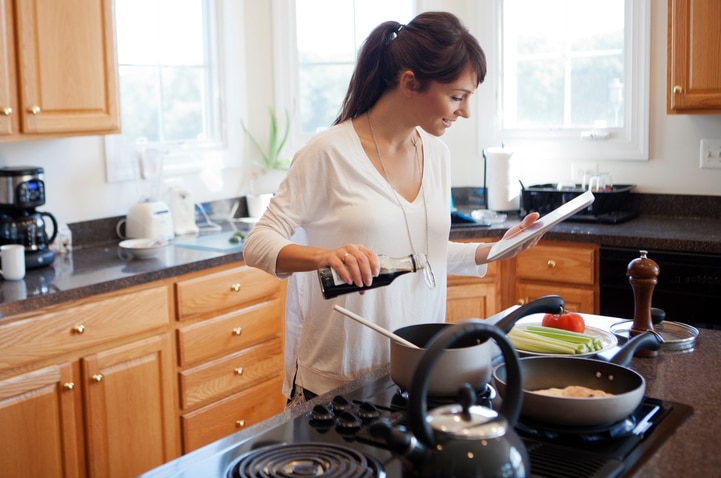Is it possible that TV cooking shows are a recipe for trouble?
A new study by researchers at the University of Massachusetts Amherst sheds some not-so-positive light on what happens in the kitchens ruled by TV chefs. With that study as a jumping-off point, here are six lessons from TV cooking shows that you should put on your home-cooking menu.
1. Be mindful of food safety.
The study by the University of Massachusetts Amherst researchers examined food safety on 39 episodes of 10 popular TV cooking shows.
While the majority of the episodes complied with good practices for using and storing utensils, preventing contamination and caring for fingernails, the study says, most lacked proper attention to using gloves, and maintaining proper time and temperature controls. Furthermore, food safety practices were mentioned in just three of the 39 episodes.
Nancy Cohen, lead author of the study, says: “For most behaviors observed, the percentage of shows in conformance with recommended practices was much lower than that seen in restaurant employees and consumers in general.”
Given that 48 million cases of foodborne illness are reported each year in the U.S., the researchers were disappointed that, in general, the TV chefs didn’t take “the opportunity to model and teach good food safety practices for millions of viewers.”
2. Watch the salt.
Food blogger Krysten Dornik says she loves cooking shows and even has picked up great recipe ideas from them, although she can’t eat many of the dishes they fix due to food allergies. What she doesn’t love, however, is how TV chefs pour on the salt.
“The amount of salt that all of these chefs use in their dishes is insane. It seems like they use one-fourth of a cup of table salt in each and every dish,” Dornik says. “People are eating too much salt as it is, and TV chefs have such an incredible platform to teach people that you can make a dish taste amazing without adding all the extra salt. Spices and fresh herbs can go a long way.”
3. Ditch the refined ingredients.
Cookbook author Jorj Morgan says too many unwanted preservatives, in the form of processed ingredients, find their way into food that’s prepared on TV cooking shows.
“With this in mind, consider having the freshest version of featured ingredients possible,” Morgan says. “It’s not hard to find unrefined ingredients. Just shop the periphery of the grocery store — where the healthier groceries are — and ask specialists at the meat, produce and bakery counters if they can help.”
4. Know the (test) score.
Morgan recommends watching only those TV cooking shows that test their recipes before they’re made on the air. You can find out which TV chefs do preshow testing by searching online or posing a question on social media, she says.
Cooking-show recipes often aren’t tested ahead of time, so when everyday cooks try to replicate them at home, they don’t “turn out like the cooking-show version,” Morgan says.
5. Take your time.
“Cooking shows speed up the process, and if you take what you see too literally, it can lead to an unrealistic result,” Morgan says. “You can’t cook even a snack in 90 seconds!”
6. Don’t be discouraged.
It can be intimidating to see Rachel Ray or Jamie Oliver perform kitchen magic on TV. You shouldn’t let that stop you from aspiring to be a home-cooking star, though.
“I am here to tell you that cooking is not some mysterious dark art, a skill that is born not taught. Cooking can absolutely be learned,” cooking-show aficionado Lane Whitaker, an author and sportswriter, says on GQ.com.
Whitaker says he’s honed his home-cooking craft by studying and practicing, along with watching hours and hours of cooking shows on TV.
“When I started out, I treated every recipe as gospel, following the recommended steps with militant fervor,” Whitaker says. “Once I had developed the requisite knowledge base, I began to see spots where I could flex a little bit, and realized stuff like maybe some capers would be a nice addition to that potato salad.”

